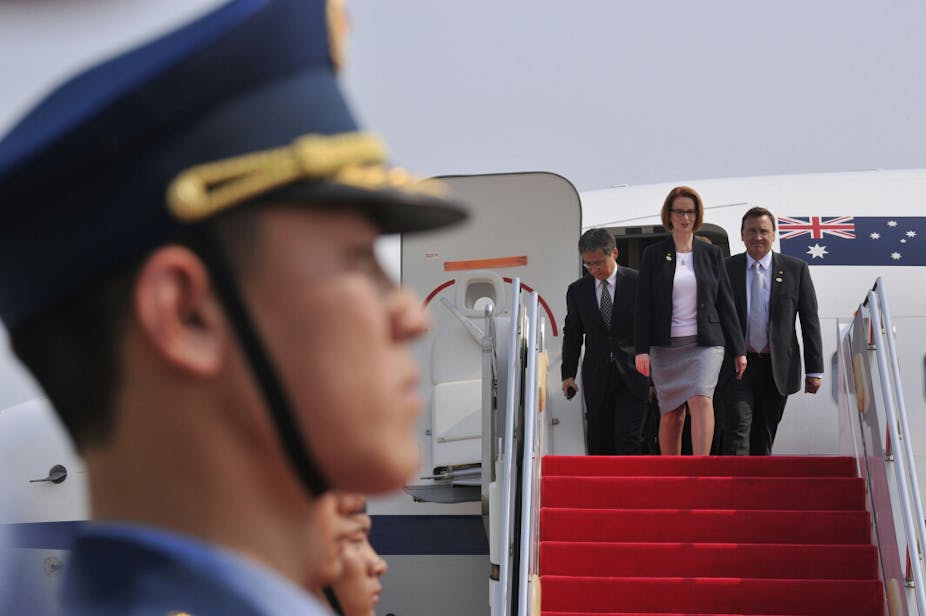A recent agreement between Australia and China to cooperate on climate change could be a tipping point that makes the Coalition’s pledge to repeal the carbon price unachievable.
Under the agreement, Australia and China will establish a carbon trading experts group and conduct joint research as China moves towards its own national emissions trading scheme after 2015. Pilot schemes are commencing involving a quarter of a billion people and carbon pricing is now a fundamental part of the China-Australia relationship.
But in truth, the scheme has been looking like an egg that can’t be unscrambled for a while now. It has many protections. First, the Senate will need to agree with a government set upon repeal, but that is unlikely given it is only a half Senate election. Because only half of the Senate is up for grabs, the Coalition would have to win in a landslide to gain control of the Senate.
Two further protections remain. The most important are the arrangements Australia has with other nations to help entrench carbon pricing. Australia’s commitment to reduce carbon originates in being a signatory to the UN Framework Convention on Climate Change (UNFCCC). The UNFCCC is only a framework, but it clearly obliges signatories to do something.
When the UNFCCC was further clarified by the Kyoto Protocols. When Australia signed up to Kyoto, its obligations to act on climate change became binding. Any government, new or returned, would receive advice that repudiating Kyoto would be too damaging, too “rogue nation” to serve the nation’s interest. It is unthinkable that during the term of Australia’s membership of the Security Council, it would be seen as advisable to undermine the greatest global effort being mustered at the present.
But the UNFCCC is not our only international obligation. We have a leadership role in the Pacific, home to the nations most vulnerable to sea level rise. The island nations of the Pacific are already suffering. The coral atoll of Cateret (Tulun) Atoll in PNG is now uninhabitable due to continual inundation caused by sea level rise and other geological factors. The Association of Small Island States represents these low lying nations. To betray these poor, vulnerable neighbours would send a bullet through our foreign policy foot.
In addition to these multilateral arrangements, bilateral arrangements are growing. The Chinese have been serious about climate change for some time. It is a difficult balance for the Chinese as increased energy use is the key to alleviating the poverty of millions. But Shanghai, perched on a river delta with depleting aquifers is highly vulnerable to sea level rise. The air quality issue is related to emissions control (although ironically increased air borne particulate matter is in fact cooling).
Given the Chinese commitment to carbon pricing and the role of Australian exports in their carbon market, it would be stupid for Australia to turn its back on the useful discussions enabled by the bilateral arrangement on carbon. The Chinese arrangement will be mirrored over time with our other trading partners. No rational government would undermine these arrangements.
Inside the nation too there are barriers to dismantling the CPRS. We hear from those businesses aggrieved by the pricing of carbon but what about the winners? So far they have been silent but there are businesses who will gain. We know of a manufacturer that has been licking its lips for some time because the installation of catalytic converters should earn valuable carbon credits. Similarly, those in the alternative energy, waste management and innovative transport industries are making decisions that rely upon the pricing of carbon. They will require significant compensation in an political environment where the much longed for surplus is a bone of contention.
And of course, there appears to be a sea change in the debate around climate change. Climate denial will always be with us but the extreme events in recent times are consistent with climate change models. These have moved the debate.
And here’s the political rub. The entrenched nature of the current carbon regime must have some implications for the Federal election itself. The arrangement with China will require all parties to look at the reality of carbon promises. Any party that promises to kill off the carbon regime may tarnish its credibility. The two parties don’t look so different once they both, willingly or unwillingly, concede that carbon pricing is here to stay.
Yes, the agreement with China to cooperate on climate change might be less significant than defence and commercial agreements, but it may prove a game changer in Australian carbon debate. In that sense, the agreement is critical for the looming election.

